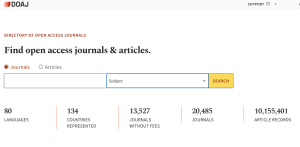The 2030 Agenda for Sustainable Development sets out 17 United Nations (UN) Sustainable Development Goals (SDGs). In addition to teaching and researching sustainable development, many colleges and universities now have Offices of Sustainability. These offices are charged with building awareness about the SDGs and changing operations to support the goal of becoming net carbon-neutral campuses. Examples of these efforts include:
- New, energy-efficient buildings may use renewable energy and have gardens on their roofs.
- Encouraging the use of electric vehicles by installing electric charging stations, rewarding car-pooling, providing campus buses, and making the campus bicycle- and pedestrian-friendly.
Academic librarians and campus facilities engineers collaborate to make their libraries greener and eco-friendly. LEED architecture for new building design, and retrofits for existing structures, are becoming more commonplace as librarians provide input on library construction projects. According to Green Libraries, there are 42 green libraries listed in the United States and Canada, with more under construction.

Libraries support UN SDGs
Libraries address sustainable development through traditional activities and innovative SD initiatives. For example, as librarians consider the inclusive nature of their collections, they turn to independent booksellers and small presses to find more diverse titles. Academic libraries are inspecting catalog records for the use of outdated and inappropriate terminology in subject headings (e.g., replacing “Aliens” with “Noncitizens”). Some libraries are examining their archival holdings for collections to share about historical injustice, such as Syracuse University Libraries Special Collections Research Center’s new digital exhibition, A Courageous Stand: The Story of the Syracuse 8, about “a group of Black student-athletes who boycotted the University football program until it addressed their allegations of racism in 1970” (Hatem, 2021).
Academic libraries are creating research guides dealing with the SDGs, such as the University of Michigan’s effort to document resources for conducting SDG research. Other libraries develop research guides for individual sustainable development goals, such as the University of South Florida LibGuide on diversity, equity, and inclusion and the Resisting Racism Research Guide from the University of Washington. The NOVA librarians have created an antiracism guide.
Libraries as social agents for development
Libraries promote the good health and well-being of their communities (Schofield, n.d.). During the pandemic, many libraries distributed food and masks and acted as COVID testing and inoculation sites. NOVA hosted multiple vaccine clinics across the campuses and NOVA Libraries distributed free masks to students. (If you need one, just stop by a Reference or Circulation desk.)
Exemplary Practice: The Sustainable Libraries Initiative creates awareness of the library ecosystem and libraries’ role as sustainability leaders in their communities. The project offers professional development opportunities for library staff to become certified Sustainability Coordinators. The website features libraries that have found ways to reduce energy, redirect waste, and increase collaborations with other groups.
“More than 90 percent of academic institutions have affordable learning initiatives” (Rea, p. 9). At the institutional level, these initiatives include reduced tuition and greater flexibility in the time allotted to complete courses required for graduating with a degree. Libraries participate by assuring fair access to resources, eliminating fees for access to research and fines for the return of overdue material. “The coronavirus pandemic has taken a financial toll on college students and sped up the process of going fines free” (Chung, 2021). The NOVA libraries “do not currently charge fines for items that are overdue.”
During the pandemic, academic libraries were the logical choice to spearhead efforts by colleges to loan laptops, iPads, Chromebooks, and hotspots to students whose classes had shifted online. Since libraries already loan books, it was simply a matter of sourcing the technology from Information Technology (IT) departments. At NOVA, the college introduced the Laptop Loaner Program where students could request and borrow a laptop for the duration of the semester, free of charge.
NOVA and sustainable development
NOVA’s Sustainability Office coordinate’s the college’s energy, environment, and sustainability initiatives. The Office hosts a webpage of sustainability ideas. If you’ve got an idea, email Rob Johnson, NOVA’s Director of Sustainability. The website offers a number of suggested ways in which students, faculty, and staff can volunteer for sustainable projects.
Educating for sustainability
NOVA students need not wait for an instructor to include a discussion of SDGs in their classes. The Sustainable Development Solutions Network (SDSN) offers free self-paced classes open to learners at any educational level. In addition to SDSN’s Global Schools Program, the SDG Academy creates and curates free Massive Open Online Courses (MOOCs) and educational materials on sustainable development and the SDGs (usdsn.org/sdg-academy or edx.org/school/sdgacademyx). Consider it a down payment on your future.
References
Hatem, C. (2021, August 28). New digital exhibition features story of The Syracuse 8. Syracuse University Campus & Community. https://news.syr.edu/blog/2021/08/28/new-digital-exhibition-features-story-of-the-syracuse-8/
Rea, A. (2021, October 21). LJ’s State of Academic Libraries Survey reveals challenges, priorities, Library Journal. https://www.libraryjournal.com/story/news/LJs-State-of-Academic-Libraries-Survey-Reveals-Challenges-Priorities
Schofield, A. (n.d.). Social workers and librarians—a case for why we are BFFs. ALA Equity, Diversity, and Inclusion blog. https://www.ala.org/advocacy/diversity/odlos-blog/social-workers



